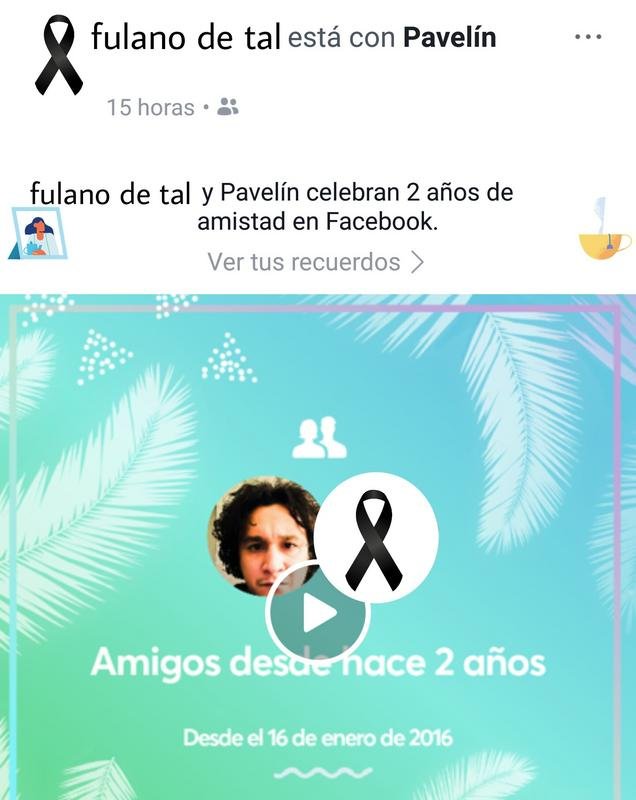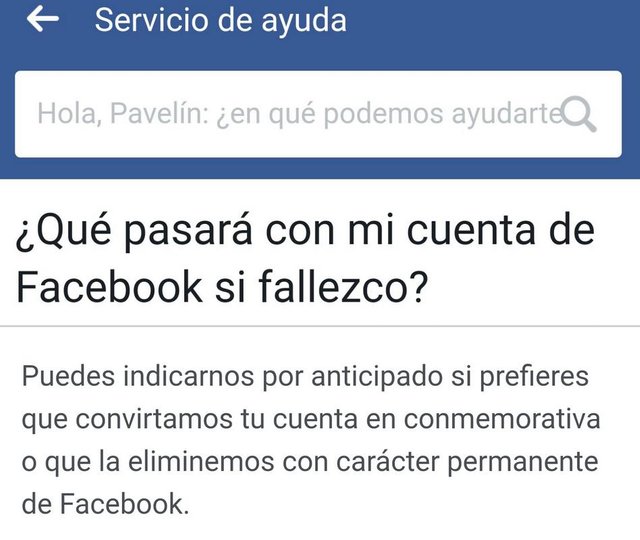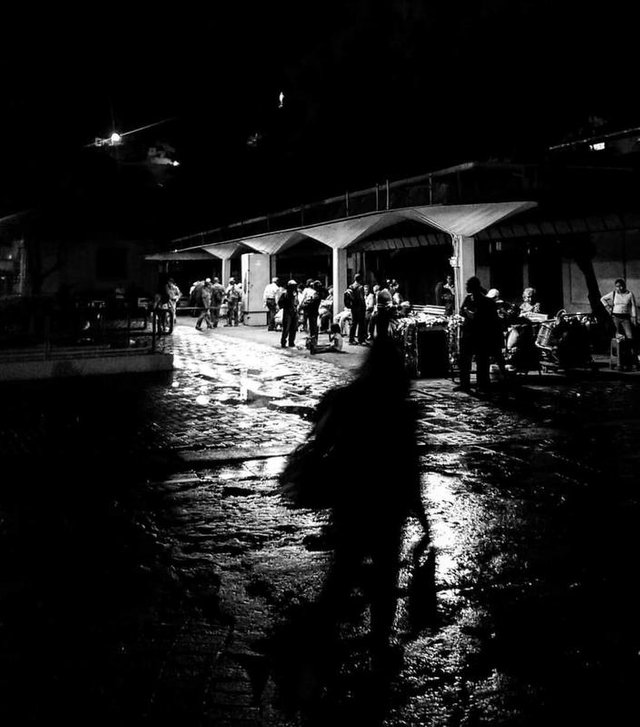
"Friend, dude, bro!, life is so weird I dreamed of today and when I woke up I found this Facebook reminder in which we commemorate another year of friendship, it feels beautiful to return to your profile and see your photos and your face, to read as if the words you wrote with such fury and conviction were coming out of your mouth, I miss you, man, why did you have to go! I refuse to accept it!"


I am sure that most people have read a Facebook post with similar words. In my country Honduras, since 2009 the average number of violent deaths is 20 people per day; I’m not the exception. Death is televised day by day on Facebook and no matter the color of our claims, everything we say only feeds the pages of the great Zuckerberg consortium.
The facebook post at the beginning is fictitious, just to disguise reality a bit, which is much darker and more sensasionalist than that.
A necessary parenthesis
Google brought me to steemit, this one to @cervantes and its publications to Discord, there, in the @cervantes channel I met @dcaroa, editor and producer of the magazine. We talked about the opportunity to participate in one of the editions, as a guest. She was very kind and enthusiastic, just like @aidarojaswriter was the day before. What a beautiful community they have built! I asked her what she had in mind for the section she was suggesting (I like to listen to the crazy ideas of the editors) and she threw a firecracker straight to my temple. She told me to talk about death, since it was the main theme of The Cervantes Magazine - Vol 18. But she did not stop there, when she inquired more, she launched the lethal question from which the title of this article emerges: Can someone die in the internet?
Closing the parenthesis. John Doe is still alive!
John Doe, the imaginary character of this literary tragedy, whom I don’t know by my own decision, made me wonder: what does death mean when the fictitious character who for so long adopted our face, words and ideas on the web, continues to live?
However, Facebook boasts of thinking about everything and provides practical "solutions" to the everyday problems of modern life. (Attention to what it says)

Wait a minute! We are talking about Latin America! Can a family of scarce resources (more than half of the population) make a process of such dimension? Do these people have Internet access and have the skills to perform these operations? How many families sunk in illiteracy can ask facebook to erase the memory of the only child who could go to school?
It is estimated that around 30 million Facebook users died in the first eight years of the network's existence. In this publication of the year 2014, The ABC,portal affirmed that EVERY DAY, near of 10,000 DEAD PEOPLE were tagged, recieved a birthday card or a friendship request. How much that number will rise in 2018?
While it is true that the Facebook algorithm can track deaths without the need for someone to send the request, this process can take months, or even years, and is not always carried out, the rule is: if nobody does the paperwork , the ghost of the profile will be in pain for eternity.
But do not worry! Facebook has all the solutions! Immortalize now! Reserve your place in history in advance! Don’t stay like a ghost in limbo! Go to the Premium category and make your own "commemorative account" in three simple steps!

It is convenient to stop to reflect and philosophize, to imagine the millions of deceased human beings that still generate content in a social network that is based on interaction to generate wealth, it is scary. The more I think about the subject, the more questions appear, and the more terrifying they are.
What are life and death in this digital age? Are there justifications for the Facebook account of a deceased person to continue interacting in the network? What could we say about facebook’s software in terms of its approach to death? Should we prevent and create a commemorative account to continue existing on social networks even after we die? How does steemit work or how should it work in relation to this issue?.
It will not be the one to answer these last questions, because I’m missing the chapter in which you write on a large blank canvas and I learn and transcribe to complete the story; Going ahead of time is a virtue that life did not give me.
"Friend, dude, bro!, life is so weird I dreamed of today and when I woke up I found this Facebook reminder in which we commemorate another year of friendship, it feels beautiful to return to your profile and see your photos and your face, to read as if the words you wrote with such fury and conviction were coming out of your mouth, I miss you, man, why did you have to go! I refuse to accept it!"

I am sure that most people have read a Facebook post with similar words. In my country Honduras, since 2009 the average number of violent deaths is 20 people per day; I’m not the exception. Death is televised day by day on Facebook and no matter the color of our claims, everything we say only feeds the pages of the great Zuckerberg consortium.
The facebook post at the beginning is fictitious, just to disguise reality a bit, which is much darker and more sensasionalist than that.
A necessary parenthesis
Google brought me to steemit, this one to @cervantes and its publications to Discord, there, in the @cervantes channel I met @dcaroa, editor and producer of the magazine. We talked about the opportunity to participate in one of the editions, as a guest. She was very kind and enthusiastic, just like @aidarojaswriter was the day before. What a beautiful community they have built! I asked her what she had in mind for the section she was suggesting (I like to listen to the crazy ideas of the editors) and she threw a firecracker straight to my temple. She told me to talk about death, since it was the main theme of The Cervantes Magazine - Vol 18. But she did not stop there, when she inquired more, she launched the lethal question from which the title of this article emerges: Can someone die in the internet?
Closing the parenthesis. John Doe is still alive!
John Doe, the imaginary character of this literary tragedy, whom I don’t know by my own decision, made me wonder: what does death mean when the fictitious character who for so long adopted our face, words and ideas on the web, continues to live?
However, Facebook boasts of thinking about everything and provides practical "solutions" to the everyday problems of modern life. (Attention to what it says)

Wait a minute! We are talking about Latin America! Can a family of scarce resources (more than half of the population) make a process of such dimension? Do these people have Internet access and have the skills to perform these operations? How many families sunk in illiteracy can ask facebook to erase the memory of the only child who could go to school?
It is estimated that around 30 million Facebook users died in the first eight years of the network's existence. In this publication of the year 2014, The ABC,portal affirmed that EVERY DAY, near of 10,000 DEAD PEOPLE were tagged, recieved a birthday card or a friendship request. How much that number will rise in 2018?
While it is true that the Facebook algorithm can track deaths without the need for someone to send the request, this process can take months, or even years, and is not always carried out, the rule is: if nobody does the paperwork , the ghost of the profile will be in pain for eternity.
But do not worry! Facebook has all the solutions! Immortalize now! Reserve your place in history in advance! Don’t stay like a ghost in limbo! Go to the Premium category and make your own "commemorative account" in three simple steps!

It is convenient to stop to reflect and philosophize, to imagine the millions of deceased human beings that still generate content in a social network that is based on interaction to generate wealth, it is scary. The more I think about the subject, the more questions appear, and the more terrifying they are.
What are life and death in this digital age? Are there justifications for the Facebook account of a deceased person to continue interacting in the network? What could we say about facebook’s software in terms of its approach to death? Should we prevent and create a commemorative account to continue existing on social networks even after we die? How does steemit work or how should it work in relation to this issue?.
It will not be the one to answer these last questions, because I’m missing the chapter in which you write on a large blank canvas and I learn and transcribe to complete the story; Going ahead of time is a virtue that life did not give me.
[Return to Home page]

